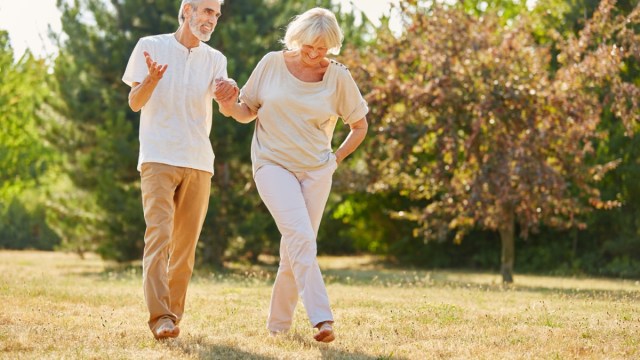Here are some of the keys to health and happiness in the golden years.
The golden years come with concerns and challenges, to be sure. But they also can truly be the best years of your life. To make the most of them, there are some simple things you shouldn’t forget to do. Remember these five doctor-recommended tips, and you’ll be well on your way to preserving your health and happiness. Read on——and to ensure your health and the health of others, don’t miss these Sure Signs You Have “Long” COVID and May Not Even Know It.

1 Don’t Ignore Quality Sleep

You might remember your parents or grandparents staying up late or rising early, claiming older adults need less sleep. Today, science says that’s not true. In fact, older adults may experience less sleep or lower-quality sleep because of conditions that can be treated, like chronic pain, insomnia or anxiety. Experts including the National Sleep Foundation recommend that adults of every age get seven to nine hours of quality sleep per night to ensure optimum health and reduce the risk of chronic illnesses like heart disease and dementia. If you’re not, your doctor can help.
2 Don’t Forget Your Routine Vaccinations

The COVID pandemic has reminded us that all adults should be up to date on routine vaccinations to keep the immune system strong and lower the risk of serious illness or death. Talk to your doctor about getting vaccinated against the flu, pneumonia, whooping cough and shingles. The CDC says every adult should get an annual flu vaccine, especially people over 60. The CDC also recommends two pneumococcal pneumonia vaccines for people 65 and older, and two doses of shingles vaccine for people over 50.
3 Drink Only In Moderation

Researchers say that during COVID-19, too many people of every age group started drinking too much alcohol. But even before the pandemic, health experts were concerned about drinking in people over 60. Recent studies have found that 10% of people over age 65 engage in binge drinking, defined as having four or more drinks in one sitting—and 10% to 15% of people don’t start drinking heavily until they’re older in age. Excessive alcohol consumption increases the risk of cancer, heart disease, physical injury and drug interactions. To stay healthy, drink moderately or abstain. Experts say women should have no more than one alcoholic beverage per day, and men should stop at two.
4 Stay Physically Active

As we age, our bodies need us to move more, not less. Experts say regular exercise improves muscle quality, prevents bone loss, boosts metabolism, and improves sleep—all major health benefits over 60. Conversely, being sedentary raises your risk of obesity, cardiovascular disease, type 2 diabetes, and dementia. The American Heart Association recommends getting 150 minutes of moderate-intensity exercise (or 75 minutes of vigorous exercise) each week. Some examples of moderate-intensity exercise include brisk walking, dancing or gardening; vigorous exercise includes running, swimming, hiking or biking.
5 Don’t Let Yourself Get Lonely

Loneliness seems to cause a stress response in the body, which can have wide-ranging health effects. Research has found that loneliness may increase older adults’ risk of dementia by 50%. A different European study found that men who reported feeling lonely over two decades were more likely to be diagnosed with cancer. As you focus on your health after 60, consider socializing as important as exercise. Keep in touch with friends and loved ones, join activity or support groups, or volunteer. And to get through life at your healthiest, don’t miss these First Signs You Have a Serious Illness.





